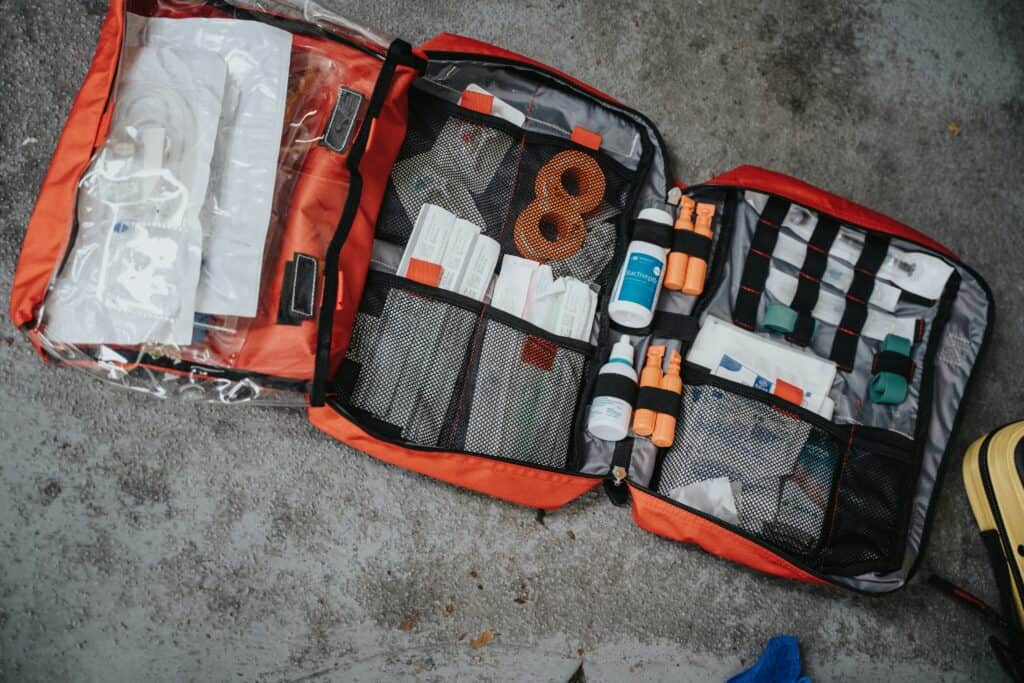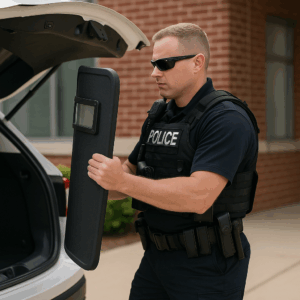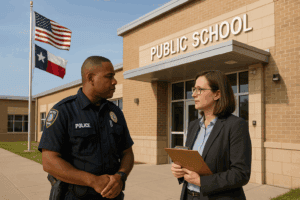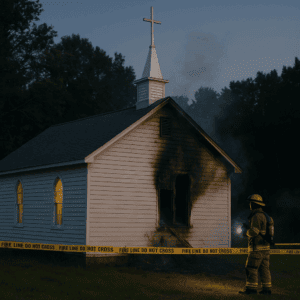In recent times, safety and security have become increasingly important for churches.
As religious institutions face new and unique challenges, church leaders must carefully consider whether armed security guards are necessary for their congregation.
This decision ultimately depends on various factors such as the church’s location, size, and any potential security threats.
When taking the step to introduce armed security guards to a church, it is advisable to employ professionals with a background in law enforcement or those who have received specialized weapons training.
These individuals undergo extensive training each year and are equipped to handle situations involving unruly, violent, or mentally unstable individuals.
Additionally, their experience allows them to make appropriate responses under high-pressure, life-or-death situations, ensuring the safety and well-being of the congregation.
Church Security: An Overview
Churches, like any other public space, must carefully consider their security measures to protect their congregation and property.
The decision to employ armed security guards is not one to be taken lightly, as it carries with it legal, ethical, and practical implications.
Churches must assess the risks associated with their specific location, congregation size, and potential threats.
A thorough risk assessment will help determine whether an armed security team is necessary or if other security measures would suffice.
Factors such as proximity to high-crime areas, prior incidents of violence, and access control tools should all be taken into account.
When approaching the decision to have armed security guards, churches should consider the legal risks and suggestions associated with this level of protection.
Hiring professional security firms or current and former law enforcement officers to serve as armed guards may mitigate some risks, as these individuals typically have extensive weapons training and experience dealing with violence or high-stress situations.
While the presence of armed guards can provide a heightened sense of security, it is also necessary to weigh the potential impact of having weapons on church premises.
There may be congregants who feel uncomfortable or unsafe knowing that weapons are present, potentially altering the welcoming and peaceful atmosphere for which churches strive.
In addition to armed security guards, churches should consider implementing a comprehensive security plan that includes measures such as video surveillance, access control systems, and regular security training sessions for staff and volunteers.
Moreover, effective communication and cooperation with local law enforcement agencies can be invaluable in ensuring church safety.
Ultimately, the question of whether a church should employ armed security guards depends on the unique circumstances and risks associated with each place of worship.
It is essential to thoroughly evaluate all the factors and options before deciding the best interests of the congregation’s safety and well-being.
When to Consider Armed Security
Assessing Potential Threats
To determine whether your church should have armed security guards, the first step is to assess potential threats that could affect your congregation.
This may include factors such as the church’s location, any previous incidents of violence, and any potential risks associated with specific ministries or programs.
By doing an objective assessment, churches can make well-informed decisions about the need for an armed security team.
Community Concerns
Another key consideration when deciding whether to employ armed security guards is the impact on the community.
Churches must weigh the benefits of increased safety against possible negative reactions from some members or visitors who may be uncomfortable with the presence of armed individuals.
It’s important to engage with the congregation and gauge their level of comfort with the idea before making any decisions.
Legal Regulations
Before implementing an armed security team, churches should also familiarize themselves with any legal regulations that may govern the use of firearms on their premises, as well as any licensing or certification requirements for security personnel.
Some states may have specific requirements for armed security guards or restrictions on who may carry firearms in places of worship, which could affect your decision.
Insurance Considerations
Lastly, it’s important to consider the potential impact on the church’s insurance.
Employing armed security may result in changes to your insurance coverage or the need for additional liability policies.
Be sure to consult with your insurance provider to understand how having armed guards may affect your coverage, as well as any recommendations they may have for your specific situation.
By taking these factors into account and maintaining a confident, knowledgeable, neutral, and clear tone, churches can make informed decisions about whether armed security is the right choice for their congregation.
Benefits and Risks of Armed Security
Safety of the Congregation
Having armed security guards can provide an added level of safety for the congregation.
Current or former law enforcement officers or weapons-trained security firms receive hours of weapons training each year and are trained to deal with unruly, violent, or mentally unstable individuals.
This ensures that they are more likely to respond appropriately under stressful conditions involving life-or-death decisions, thus contributing to the safety of the congregation.
Liabilities and Insurance Requirements
Despite the benefits of armed security, there are potential liabilities and insurance requirements that churches need to consider.
According to Brotherhood Mutual, protecting your church from violence may involve having armed security, but be sure to consider the legal risks and suggestions when deciding who should protect your congregation.
Improving Preparedness
In addition to having armed security, churches should also focus on improving their overall preparedness for various emergencies.
This can be achieved by developing safety and security plans and having a volunteer safety team in place.
By weighing the benefits and risks of armed security, each church can make an informed decision on whether to implement such measures while also improving its overall preparedness.
Hiring Professional Security Services
Every church must carefully evaluate its security needs and consider the potential risks to its mission and ministries.
When opting for armed security guards, it is essential to choose the right personnel.
This section covers two viable options: current and former law enforcement officers (LEOs), and professional security firms.
Current and Former LEOs
Current and former law enforcement officers are an excellent choice for armed security within churches.
These professionals have the advantage of:
- Extensive weapons training: They receive hours of weapons training each year, ensuring they are up-to-date with current protocols.
- Experience with various situations: LEOs are trained to handle scenarios involving unruly, violent, or mentally unstable individuals.
- Appropriate response: Their extensive security experience enables them to respond appropriately under stressful and potentially life-or-death situations.
Hiring current or former law enforcement officers, as part of your church’s security team, can bolster overall safety and provide added peace of mind for your congregation.
Security Firms
Professional security firms are another option for churches considering armed security guards.
When selecting a security firm, focus on those that specialize in weapons-trained personnel and have experience working with religious institutions.
Some benefits of partnering with a security firm include:
- Tailored security plans: Security firms often assess a church’s specific needs and design the appropriate security plan accordingly.
- Expertise and experience: Reputable security firms hire and train their guards to address various security situations effectively and efficiently.
- Reliability and flexibility: A professional security firm can provide coverage regardless of scheduling changes or unforeseen circumstances. This flexibility ensures your church’s security is not compromised during peak activity times or special events.
By thoroughly assessing your church’s unique security requirements and exploring both law enforcement officers and professional security firms, you can make an informed decision on the best course of action to protect your congregation, and your mission and ministries.
Unarmed Security Alternatives
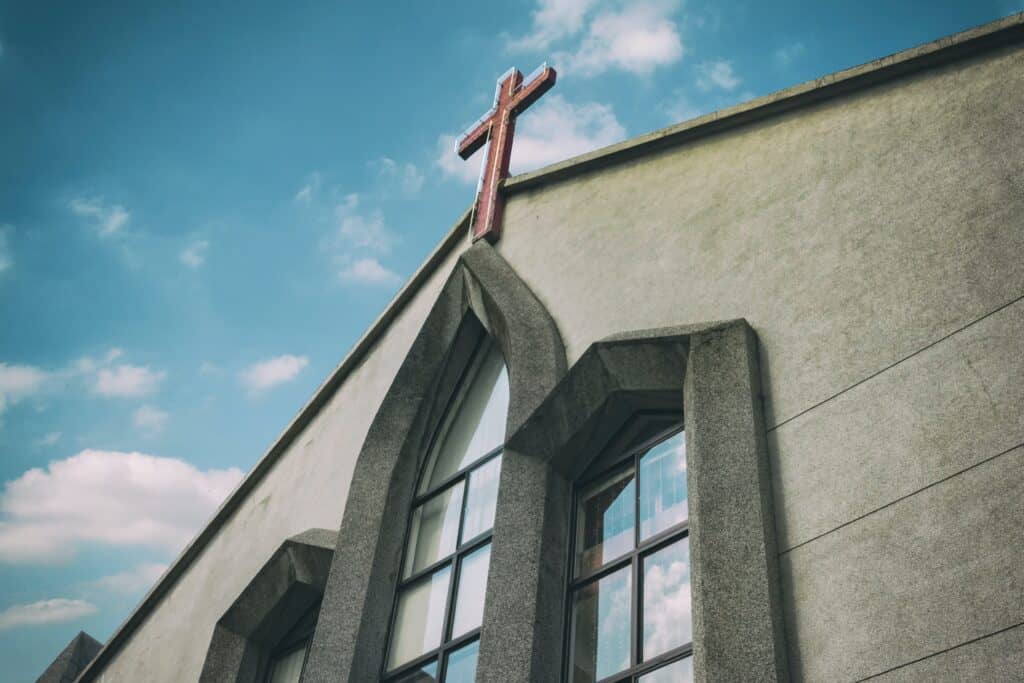
Volunteer Security Team
A reliable alternative to armed security guards is establishing a volunteer security team.
This team can comprise dedicated and responsible members of the church community, who are willing to keep the premises safe during events and services.
While they may lack the specialized training that armed professionals possess, volunteer security teams can still be trained in basic emergency response and conflict resolution skills.
By creating a strong sense of mission within the team, volunteers often become more committed to maintaining a safe environment for the church’s ministries.
Emergency Response Plan
Another important aspect of church security is having a well-defined emergency response plan in place.
This plan should outline the steps that need to be taken during various emergencies, such as a fire, medical emergency, or an act of violence.
Regularly updating and practicing this plan can significantly improve the readiness of the church community to handle emergencies, even without professional armed security.
Developing an emergency response plan involves assessing potential threats, assigning responsibilities to key personnel, and establishing clear communication channels.
Additionally, it’s beneficial to coordinate with local law enforcement agencies which can offer guidance and assistance during critical situations.
By having a comprehensive plan in place, churches can feel more confident and prepared to effectively respond to emergencies, ultimately protecting their congregants and ministries.
Concluding Considerations
Every church must carefully assess its unique situation to determine if armed security is necessary.
When making this decision, it’s important to consider factors such as location, congregation size, and known security threats.
Ultimately, the goal is to create a secure and welcoming environment for all attendees.
If a church decides that armed security guards are essential, it’s crucial to select trained professionals.
When implementing an armed security team, it’s also vital to maintain transparent communication with the congregation.
Informing churchgoers about the presence of armed guards and their purpose can help create a sense of unity and security.
Additionally, churches should regularly review and update their safety protocols.
This ongoing process can help ensure that the church remains a safe and secure place for everyone in attendance.
By taking a proactive approach, churches can work together with security professionals to maintain a secure environment.
Frequently Asked Questions
What factors should be considered when deciding on armed security for a church?
When deciding whether a church needs armed security, it is essential to assess the specific risks and concerns within the context of their location, congregation size, and past incidents. These factors will help determine if armed security is necessary or if alternative security measures may suffice.
What type of training should armed security guards have?
Armed security guards should have extensive training in handling weapons, as well as experience dealing with unruly, violent, or mentally unstable individuals. It is recommended to use current or former law enforcement officers or weapons-trained security firms as they possess the necessary skills and training required for the job.
How can a church ensure proper response in life-or-death situations?
By hiring professionals with a background in law enforcement or armed security, the church can be confident that these individuals have the necessary training to make appropriate decisions under stressful, life-or-death situations. Training also helps them assess risks and determine the appropriate course of action.
What are the legal implications of having armed security guards at a church?
The legal implications of having armed security guards at a church vary depending on the jurisdiction. Some states may have specific regulations or licensing requirements for armed security personnel. The church must consult legal counsel and ensure that all relevant laws and regulations are followed.
How does the presence of armed security guards affect the congregation’s sense of safety?
Armed security guards can provide an increased sense of safety for the congregation, but it can also create a feeling of unease for some members. Church leaders should address these concerns and communicate the reasons for having armed security, focusing on the safety and well-being of the community.
What are the alternatives to having armed security guards at a church?
Alternatives to having armed security guards at a church can include security cameras, monitored alarm systems, volunteer safety teams, or unarmed security personnel. These options can provide a sense of security while avoiding potential concerns associated with armed guards. However, it is essential to evaluate the specific needs and risks of the church when considering alternatives.



